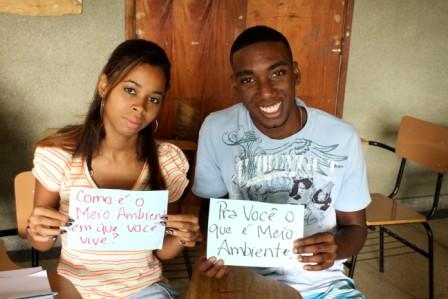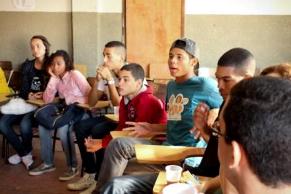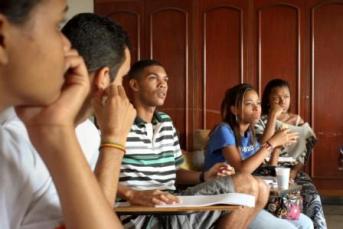
By Eduardo Nunes, World Vision's National Director in Brazil
Young people today are demanding to be heard, more than in any other era in global history. And they have earned that right. Bolstered by the Arab Spring and the 99 percent movement, youth are showing the way toward meaningful change -- social, environmental and developmental. When world leaders meet in Rio de Janeiro this week for the Rio+20 U.N. Conference on Sustainable Development, they would be wise to listen to these voices.
Voices like 19-year-old Edgleison Rodrigues. He and a group of other local young people from Brazil plan to attend the Rio+20 and make sure world leaders hear their views on the future from the environment to long-term development.
"We really have to occupy this space because here they are deciding our future, and also our present and they have to hear what we have to say," he said.

The cries of young people are more urgent than ever. Despite significant progress in the past decade, more than seven million children under the age of five still die every year from preventable causes like disease, undernourishment and unsafe household energy use. Those who survive childhood are lucky to find any sort of work as unemployment rates of 50 percent ravage countries. Our future is being tragically squandered -- tragic for the victims but tragic also because we are losing a critical resource whose fresh ideas and openness to innovation can help build a better tomorrow.
For the world's poor, the 1990s were a decade of hope, based on western economic prosperity and the political will to eliminate or reduce substantially hunger, poverty and disease. The decade provided the foundation for the Millennium Development Goals (MDG), which have been a powerful tool for rallying people and governments around fighting poverty.
Initial progress toward achieving those goals, however, has been derailed by the global recession and its lingering aftermath. The Rio+20 conference will consider practical ways of achieving the original MDGs by the 2015 deadline, as well as asking the critical question "What next?"
The answer lies in a renewed commitment to the world's most vulnerable citizens, its children. The conference will focus on "the future we want" -- how a green economy contributes to sustainable development, and how sustainable development eradicates poverty. To be completely successful, this future must be viewed from the perspective of child development.

Undernourishment contributes to the deaths of nearly three million children a year. Despite increases in food production, nutritious food is often not getting to those who need it most. If the Rio+20 delegates focus on the nutritional needs of children, they can develop a truly sustainable food policy. Such a policy must include monitoring measures to hold host nations accountable for the nutritional intake of their children. Healthy children grow into healthy adults. Studies show that a five percent drop in child mortality rates produces a one percent boost to economic growth over the subsequent decade. In the least developed nations, children comprise up to one-half the total population. There can be no development efforts without children being at the forefront. Involving them in the search for solutions just makes sense.
If there is ever to be a Rio+40, the children of Rio+20 will be those taking a leadership role. They need to be involved in developing development policies now, this year. We're still a long way off from achieving the world we dreamed of in 1992, but World Vision believes that to build the world we dream of in 2012, we must involve children and young people. Focusing on children, by its very nature, is sustainable development.